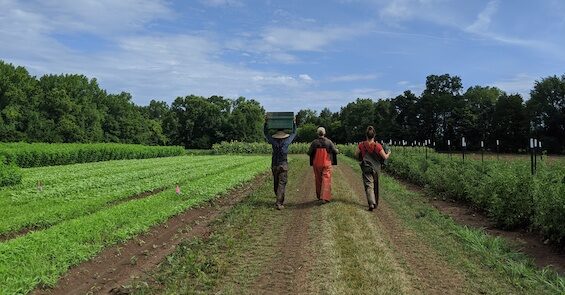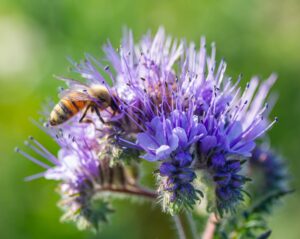October 8, 2020 – Editor’s Note: The National Sustainable Agriculture Coalition (NSAC) created a blog series on Rep. Chellie Pingree’s Agriculture Resilience Act (ARA), the first comprehensive piece of legislation introduced in the House of Representatives addressing climate change and agriculture. Blogs one through seven focus on specific provisions within the ARA; whereas this eighth and final blog in the series summarizes current climate and agriculture legislation. This final blog was co-authored by Billy Hackett, Policy Fellow at NSAC, and Cristel Zoebisch, Climate Policy Associate at NSAC in partnership with the Organic Farming Research Foundation.
Learn more about the ARA by reading blogs one, two, three, four, five, six, and seven here.
As severe weather events and wildfires have ravaged the country during the last few months and the presidential election nears, the climate crisis continues to be a major topic of discussion on Capitol Hill. Against the backdrop of negotiations to avoid a government shutdown on September 30 and additional pandemic relief, legislators in the House of Representatives passed the Clean Economy Jobs and Innovation Act(H.R. 4447), a broad, clean energy package that would invest billions of dollars to promote research and development for technologies to address climate change. The bill is primarily focused on the transition to clean energy production and is viewed as a down payment in the fight against the climate crisis. There were a few amendments introduced and accepted as part of the bill that focus on agriculture, including Amendment #68, introduced by Rep. Pingree (D-ME-1) and Rep. Spanberger (D-VA-7). Their amendment calls for inclusion of agricultural and grazing practices and forest management and afforestation as additional priorities in the Department of Energy carbon removal program established in the bill.
The Clean Economy Jobs and Innovation Act will establish a research, development, and demonstration program to remove carbon dioxide from the atmosphere on a large scale, prioritizing technologies and strategies that have the potential to meet emissions reduction goals outlined in the Paris Agreement. The Pingree-Spanberger amendment now widens the bill’s focus beyond high tech carbon capture to include agriculture and forestry practices. While this particular bill includes only minor agriculture provisions, there are many more bills that have been introduced in both chambers of Congress that address agriculture and climate change more directly and comprehensively that could also be incorporated into future climate legislation.
In this blog post, we summarize key bills that center on agriculture and its role in addressing the climate crisis. We begin with bills that have been introduced in both chambers, followed by those introduced only in the House of Representatives, those only introduced in the Senate, and finally we present resolutions and other proposals. While this is not a comprehensive list of all climate and agriculture bills, this list reflects key pieces of legislation to track as policy proposals around climate change continue to evolve on Capitol Hill.
Bicameral
Climate Stewardship Act of 2019 (H.R.4269 / S.2452)
Sen. Cory Booker (D-NJ) and Rep. Deb Haaland (D-NM-1) introduced the Climate Stewardship Act of 2019 to provide incentives for agricultural producers to carry out climate stewardship practices. While much of the bill is focused on forestry and wetlands, here we summarize the agricultural land conservation provisions in the legislation. Most notably, the bill would authorize increased funding for several federal conservation programs. Mandatory funding for both the Conservation Stewardship Program (CSP) and Environmental Quality Incentives Program (EQIP) would increase from approximately $1 and $2 billion per year, respectively, to $7 billion per year for each program, with all additional funds dedicated to financing new climate stewardship practices. The legislation would also increase funding for the Regional Conservation Partnership Program (RCPP) from $300 million annually to $1 billion by 2028 and the Agricultural Conservation Easement Program (ACEP) from $450 million to $900 million per year, as well as finance 13 million additional acres as part of the Conservation Reserve Program(CRP). Funding for the Rural Energy for America Program (REAP) would increase from $50 million annually to $3 billion by 2024. The legislation would also increase funding for the Local Agriculture Market Program (LAMP) by a factor of 10 to $500 million, in addition to investing $25 million per year in urban farms and community gardens in low-income areas.
Food Date Labeling Act of 2019 (H.R.3981 / S.2337)
Rep. Chellie Pingree (D-ME-1) and Sen. Richard Blumenthal (D-CT) introduced the Food Date Labeling Act of 2019to reduce unnecessary waste by standardizing the date labels on food which cause a great deal of consumer confusion. In the absence of federal regulations related to date labels on food products, inconsistent and ambiguous “Best If Used By” and “Use By” labels have become common. These labels contribute to the estimated 90 percent of Americans who prematurely throw away food that is perfectly safe to consume. This bill lays out clear guidelines by which food manufacturers may define and use the aforementioned labels, with the former a “quality date” which denotes the food’s optimal consumption period has passed and the latter a “discard date” which means the food is no longer safe to be consumed. Establishing this common standard is expected to decrease instances of premature food waste. Between 2010 and 2016, food loss and waste accounted for 8 to 10 percent of total greenhouse gas emissions globally (IPCC Special Report on Climate Change and Land). The Food Date Labeling Act of 2019would help decrease food waste by ensuring clear labels help consumers minimize food waste at home.
Farmer Driven Conservation Outcomes Act of 2020 (H.R. 6182 / S.3429)
Sens. Bob Casey (D-PA) and Shelly Moore Capito (R-WV) and Reps. Marcia Fudge (D-OH-11) and Glenn ‘GT’ Thompson (R-PA-15) introduced the Farmer Driven Conservation Outcomes Act of 2020 to establish a clear process for the U.S. Department of Agriculture (USDA) to measure, evaluate, and report on federal conservation program outcomes. The authorized system would quantify the environmental benefits of conservation activities, establishing a clear empirical foundation upon which farmers, researchers, and policymakers may understand which climate stewardship practices are most effective by region and which practices to implement to improve soil health, air and water quality, water conservation, and wildlife habitat. Ultimately, this bipartisan bill will inform how climate change adaptation and mitigation may be maximized through farmer conversation efforts.
National Climate Bank Act (H.R.5416 / S.2057)
Rep. Debbie Dingell (D-MI-12) and Sen. Ed Markey (D-MA) and Chris Van Hollen (D-MD) introduced the National Climate Bank Act in 2019, which would establish a National Climate Bank to publicly finance projects designed to advance renewable energy and reduce greenhouse gas emissions. With $35 billion in federal funding and mechanisms to attract private investments, bank investments would be made to local, regional, and state green banks or directly to eligible projects. The direct funding mechanism would be coupled with provisions for technical assistance and reduce traditional barriers to access for members of low-income and socially disadvantaged communities. Agricultural projects are listed in this bill as one of ten project types eligible for investment, which positions farmers and ranchers as key actors in our efforts to mobilize around the climate crisis.
Growing Climate Solutions Act of 2020 (H.R.7393 / S.3894)
Sens. Mike Braun (R-IN) and Debbie Stabenow (D-MI) and Reps. Abigail Spanberger (D-VA-7) and Don Bacon (R-NE-2) introduced the Growing Climate Solutions Act of 2020to authorize the USDA to certify private carbon markets, technical assistance providers, and market verifiers. This bill aims to facilitate farmer and rancher participation in private carbon markets by creating a self-certifying process for technical assistance providers and carbon market verifiers to register and be listed on a USDA website. In its current form, the legislation does not include an accreditation process, opting instead for self-certification, and does not require USDA to establish a conflict of interest policy. Hence, verifiers could be in the employ of businesses and organizations running the carbon market. Nonetheless, the goal of the legislation is to bring transparency and build trust among farmers and ranchers seeking to participate in private carbon markets.
House of Representatives
Agriculture Resilience Act (ARA; H.R. 5861)
The Agriculture Resilience Act is the most comprehensive climate and agriculture legislation introduced in this Congress and has been covered extensively in this blog series. We have covered the goals section of the ARA for agriculture to reach net zero emissions by 2040, provisions on ecosystem services and carbon markets, a new program to support climate-friendly manure management, expansions and improvements to federal working lands conservation programs, provisions to promote climate and agriculture research at USDA, a new block grant program to support state and Tribal soil health programs, and ways federal programs can further incentivize adoption of advanced grazing management.
An overall summary of the bill is available here.
Cultivating Organic Matter through the Promotion of Sustainable Techniques (COMPOST) Act (H.R. 6023)
Reps. Julia Brownley (D-CA-26) and Chellie Pingree (D-ME-1) introduced the Cultivating Organic Matter through the Promotion of Sustainable Techniques (COMPOST) Actin 2020 to define composting as a conservation practice in the Food Security Act of 1985. This amendment would enable farmers to receive conservation program payments for composting through USDA conservation programs like the Environmental Quality Incentives Program(EQIP) and Conservation Stewardship Program(CSP). Compost is among the most environmentally friendly means to dispose of food waste and other organic wastes, given its abilities to minimize pollution of water sources and greenhouse gas emissions while simultaneously enhancing soil health and fertility that help build agricultural resilience to the impacts of climate change. The provisions within the COMPOST Act are included in the ARA.
Healthy Soil, Resilient Farmers Act (H.R. 8057)
Rep. Abigail Spanberger (D-VA-7) introduced the Healthy Soil, Resilient Farmers Act earlier this year to create a “Soil Health Transition Loan Program” at USDA under the Farm Service Agency’s (FSA) Conservation Loan Program to support farmers and ranchers hoping to start or improve their conservation efforts. USDA would distribute these loans and help crop and livestock producers enhance their soil health and increase their soil carbon levels. Farmers and ranchers looking to adopt best soil health practices will have additional flexibility, including a three-year deferment on the loan’s interest and payments on loan principle as they adopt practices such as cover-cropping, resource-conserving crop rotations, advanced grazing management, and organic production. The bill strengthens successful, voluntary conservation practices that work in concert with the environment, enhance our soils’ carbon sequestration potential, and provide long-term economic benefits for farmers and ranchers.
School Food Recovery Act of 2020 (H.R. 5607)
Reps. Chellie Pingree (D-ME-1), Dan Newhouse (R-WA-4), and Suzanne Bonamici (D-OR-1) introduced the School Food Recovery Act of 2020to establish a grant program for schools to implement food waste reduction programs. Schools selected through an application process will lead on food recovery and ensure that students have sufficient nutrition by establishing a food waste measurement, prevention, and reduction project. In addition, the competitive program will prioritize funding for schools collaborating with community partners and incorporate a number of experiential education activities for students to internalize the value of proper food use. Food waste emits methane, a powerful greenhouse gas, and represents misuse of water, labor, and other resources that went into producing and transporting those products. This bill would enable schools to be part of the climate solution through food waste mitigation. Many of the provisions in this bill were incorporated into the ARA.
Food Recovery Act of 2020 (H.R. 5841)
Rep. Chellie Pingree (D-ME-1) introduced the Food Recovery Act of 2020to decrease the incidence of food waste through the implementation of numerous initiatives, several of which are comparable to provisions included in bills covered thus far. This bill establishes a common standard for date labeling, calls for studies to analyze barriers which prevent the donation of surplus food, creates a grant program to help schools reduce food waste, and increases support for food waste-to-energy and composting projects at the farm, municipal, county, and state levels.
This is not Rep. Pingree’s first time introducing a version of the Food Recovery Act as a longtime vocal champion of sustainable food and farming issues. Without these or comparable actions, an estimated 40 percent of food produced in the United States will continue to be wasted and methane—which is 21 times more powerful than carbon dioxide —will continue to be emitted at unsustainable rates. Many of the provisions from this bill were also incorporated into the ARA.
Senate
America’s Clean Future Fund Act (S. 4484)
Sen. Dick Durbin (D-IL) introduced the America’s Clean Future Fund Actwhich would establish a number of programs and incentives to reduce greenhouse gas emissions, chief among them the establishment of an incremental carbon fee no later than 2023. The bill would also create an independent federal agency, the Climate Change Finance Corporation (C2FC), to invest in clean energy job creation and broader climate resilience. These aims would be achieved through grant programs for states and local governments to ease the transition for carbon-intensive industries and employees, as well as rebates and refunds to individuals and facilities who capture, store, and/or utilize carbon. To this end, the bill includes an agricultural payments section that would establish a new program to pay farmers and ranchers for implementing practices that sequester carbon and reduce greenhouse gas emissions. This bill includes both the revenue-generating mechanism and a plan for how to utilize the revenue from the carbon fee to incentivize transition to sustainable and climate-friendly industries and practices.
21st Century Civilian Conservation Corps Act (S.4434)
Sens. Ron Wyden (D-OR) and Cory Booker (D-NJ) introduced the 21st Century Civilian Conservation Corps Act to revive the Civilian Conservation Corps (CCC) to the tune of $9 billion for fiscal year 2020 to remain available until 2022. The original CCC was established in the midst of the Great Depression by President Franklin D. Roosevelt to employ hundreds of thousands of young, out-of-work Americans, who engaged in job training and conservation projects across the country. In terms of agriculture, this bill’s reimagining of the popular national service program includes a provision for new, supplemental funding for the Conservation Stewardship Program (CSP) to support eligible climate stewardship practices, including cover crops, conservation crop rotation, rotational grazing, and silvopasture. Existing CSP programs and funding would not be changed by this legislation. The bill would create a set aside to make payments to be used exclusively to enroll in CSP contracts comprised predominantly of the climate stewardship practices listed in the legislation, protecting existing CSP funding but adding funding and incentivizing farmers to implement climate stewardship practices.
This is not the only climate-focused CCC bill that has been introduced recently, but we highlight it in this blog post due to its emphasis on CSP. Other comparable efforts to revive the CCC include the 21st Century Conservation Corps for Our Health and Our Jobs Act (H.R. 7264)introduced by Rep. Joe Neguse (D-CO-2), which calls for an additional $5.5 billion in funding to remain available until 2023 for the Regional Conservation Partnership Program (RCPP). This additional funding would be specifically for alternative funding arrangements. These two versions of CCC legislation place a greater emphasis on agricultural conservation practices than many others, hence their inclusion in this blog post. NSAC will continue to monitor CCC proposals as they are released, particularly those that include substantial agricultural sections.
Other Proposals
Green New Deal (H. Res 109/S. Res 59)
Rep. Alexandria Ocasio-Cortez (D-NY-14) and Sen. Ed Markey (D-MA) introduced a resolution in 2019, the Green New Deal, as a broad framework for the United States to create a sustainable 21st century economy with millions of high-wage jobs in new green industries and achieve net-zero carbon emissions by 2050. This is an aspirational declaration to guide our country’s vision, though it is not a bill with concrete provisions. The resolution includes benchmark guiding principles to reimagine nearly every sector of the economy, including manufacturing, energy, waste management, transportation, infrastructure, and agriculture, with the intent to build out specifics policies and programs through legislation over time. Support for family farming, expanding land use practices that increase soil health and carbon storage, and establishing universal access to healthy food are explicitly included as priorities in the agriculture sector.
Rural Green Partnership Framework
Rep. Cheri Bustos (D-IL-17) introduced the Rural Green Partnership in 2019 to the Select Committee on the Climate Crisis as a broad framework of principles for rural communities to play a key role in combating climate change. The proposal outlines a variety of ideas for the agriculture sector to lead this charge. These include increased funding for existing or perhaps new conservation programs to incentivize the wider adoption of precision agriculture and conservation management farming practices to maximize soil carbon sequestration, reduce runoff, and optimize fertilizer inputs. There are similar calls for integrated crop and livestock operations to receive incentives to maximize the soil carbon sequestered in their cropland. The framework also calls for expanding the number and capacity of conservation technical experts capable of offering one-on-one advice to agricultural producers would make these programs more accessible. Finally, in addition to new investments in research and development, the framework calls for expanding grants and loans for farm and ranch operations which improve overall energy efficiency and generation.
What Comes Next?
While none of these bills will become law this year as there are very few days left in the 116thCongress, now is the time to further develop the narrative around the key components of these bills and how they can be incorporated into comprehensive federal legislation for consideration in the 117th Congress (2021-22). It is possible that the 117th Congress could take up long overdue, comprehensive federal legislation to address the global climate crisis. While transportation, energy, and economic development will likely continue to receive the most attention in climate legislative discussions, food and agriculture systems have a critical role to play in addressing the climate crisis, as NSAC has stated in our Climate and Agriculture position paper, our farmer climate sign-on letter, and in this blog series on the ARA.
OFRF and NSAC encourage legislators to ensure sustainable agriculture producers have a seat at the table as climate policy discussions continue, and we encourage Congress to use the ARA as a roadmap for comprehensive policy proposals to expand and improve existing USDA programs for agriculture to fulfill its climate mitigating potential and be part of the solution. Legislators must ensure farmers and ranchers have the tools, resources, and incentives they need to transition to climate-friendly production systems that improve soil health, enhance carbon sequestration, mitigate greenhouse gas emissions, reduce runoff and soil erosion, and protect water and air quality.
Read our blog summarizing the House Select Committee on the Climate Crisis report here, in addition to the agriculture chapter fact sheet and the full report. You can also read the Senate Democrats’ Special Committee on the Climate Crisis report here and NSAC’s recommendations to the Special Committee here.





 October 14, 2020 –
October 14, 2020 – 

 September 30, 2020–OFRF is pleased to share the news that our board member, Dr. Carolyn Dimitri, an Associate Professor of Food Studies at New York University, has been appointed to the National Organic Standards Board (NOSB). The NOSB is made up of 15 volunteer members representing the organic community. Carolyn and the four other new members will serve five-year terms beginning in January 2021. Read the USDA’s
September 30, 2020–OFRF is pleased to share the news that our board member, Dr. Carolyn Dimitri, an Associate Professor of Food Studies at New York University, has been appointed to the National Organic Standards Board (NOSB). The NOSB is made up of 15 volunteer members representing the organic community. Carolyn and the four other new members will serve five-year terms beginning in January 2021. Read the USDA’s  August 26, 2020 – OFRF’s free beginning farmer training program for organic specialty crop farmers in California is now available. This online training program is for beginning farmers, existing organic farmers, and farmers in transition to organic production. While it was developed for California specialty crop farmers, the content is based on foundational principles that are relevant to all organic farmers and our hope is that growers across the U.S. find it to be a useful resource. The self-guided nature of the training program allows you to move through the readings and resources, visual and written content, and demonstration videos at your own pace.
August 26, 2020 – OFRF’s free beginning farmer training program for organic specialty crop farmers in California is now available. This online training program is for beginning farmers, existing organic farmers, and farmers in transition to organic production. While it was developed for California specialty crop farmers, the content is based on foundational principles that are relevant to all organic farmers and our hope is that growers across the U.S. find it to be a useful resource. The self-guided nature of the training program allows you to move through the readings and resources, visual and written content, and demonstration videos at your own pace.